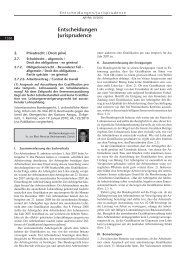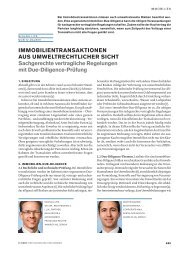ASAB 29-3 Thomas Rohner Michael Lazopoulos - Pestalozzi ...
ASAB 29-3 Thomas Rohner Michael Lazopoulos - Pestalozzi ...
ASAB 29-3 Thomas Rohner Michael Lazopoulos - Pestalozzi ...
You also want an ePaper? Increase the reach of your titles
YUMPU automatically turns print PDFs into web optimized ePapers that Google loves.
T. ROHNER & M. LAZOPOULOS, RESPONDENT’S REFUSAL TO PAY ITS SHARE OF THE<br />
ADVANCE ON COSTS<br />
With regard to the argument that the arbitral tribunal has no authority<br />
to render a decision on the reimbursement of the substituted advance on costs<br />
because most institutional arbitration rules leave financial matters to the<br />
arbitral institution, and not to the arbitral tribunal, the following can be<br />
stated: First, the fact that most institutional arbitration rules put the arbitral<br />
institution in charge of the collection of the advance on costs is not<br />
inconsistent with the arbitral tribunal’s power to adjudicate disputes<br />
regarding the non-payment of the advance on costs. The collection of the<br />
advance payments is an administrative service of the arbitral institution in<br />
support of the arbitral tribunal. In cases where the arbitration is not<br />
administrated by an arbitral institution, such administrative work has to be<br />
undertaken by the arbitral tribunal itself. Thus, the respective institutional<br />
arbitration rules do not transfer any power from the arbitral tribunal to the<br />
arbitral institution. Particularly, they do not empower the arbitral institution<br />
to compel the respondent to pay its respective share of the advance on costs. 22<br />
Second, the arbitral tribunal’s power to grant a request for immediate<br />
reimbursement of the substituted advance payment is not (only) based on the<br />
respondent’s breach of an (institutional) arbitration rule, but rather on the<br />
respondent’s breach of its contractual obligation under the arbitration<br />
agreement. The latter is not a procedural obligation, but a matter of<br />
contractual substance.<br />
The respondent who agrees to arbitration, but later refuses to pay the<br />
requested share of the advance on costs does not only breach its contractual<br />
obligation under the arbitration agreement, but also behaves inconsistently<br />
with the requirements of good faith. 23 Good faith is a fundamental principle<br />
in international arbitration and follows on from the nature of the arbitral<br />
process itself and a party’s duty to its contractual obligations. 24 In this regard,<br />
the Swiss Federal Supreme Court held that the parties to arbitration are bound<br />
by the duty of good faith to omit all conduct which might delay the normal<br />
process of the arbitration proceedings. 25<br />
22<br />
23<br />
24<br />
25<br />
YVES DERAINS/ERIC SCHWARTZ, supra note 7, at 343.<br />
IBRAHIM FADLALLAH, supra note 13, at 55; FRANZ SCHWARZ/CHRISTIAN KONRAD, supra note 15, at<br />
745 et seq.; ANNA-MARIA TAMMINEN, supra note 17, at 286 et seq.<br />
GARY BORN, International Commercial Arbitration, The Hague (2009), at 1012; WERNER<br />
WENGER/CHRISTOPH MÜLLER, in: Basler Kommentar Internationales Privatrecht, Heinrich Honsell et<br />
al. (eds.), Basel (2007), article 178 no. 79, at 1554 et seq.<br />
Decision 108 Ia 197 of the the Swiss Federal Supreme Court dated 10 May 1982: “Les parties qui<br />
compromettent sont dès lors tenues par les règles de la bonne fois d’éviter tout ce qui pourrait<br />
retarder sans nécessité absolue le déroulement normal de la procédure arbitral.”<br />
<strong>29</strong> ASA BULLETIN 3/2011 (SEPTEMBER) 555




